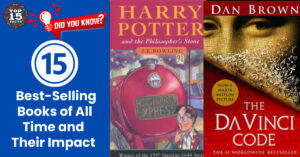Introduction
William Shakespeare, the Bard of Avon, is renowned as one of the greatest playwrights in history. His iconic works like Hamlet, Romeo and Juliet, and Macbeth continue to captivate audiences worldwide. However, beyond the well-known plots and famous lines lie a treasure trove of surprising facts that will deepen your appreciation for these timeless masterpieces. Let’s delve into 15 of these mind-blowing revelations!
15 Surprising Facts about Shakespeare’s plays
- Shakespeare wasn’t always the original – he ‘borrowed’ plots.
- Hidden insults and dirty jokes abound in Shakespeare’s plays.
- Hamlet is Shakespeare’s longest and most complex play.
- Women weren’t allowed on stage – young boys played female roles.
- Shakespeare invented thousands of words we still use today.
- The Globe Theatre burned down during a performance.
- Some believe Shakespeare wasn’t the true author of his plays.
- Queen Elizabeth I was a big fan of Shakespeare’s comedies.
- Many Shakespearean characters meet gruesome deaths.
- Superstitions and curses are associated with Macbeth.
- Shakespeare’s plays have been translated into over 80 languages.
- Shakespeare likely collaborated with other playwrights.
- Some of Shakespeare’s most famous lines might be misquotes.
- Shakespeare’s plays inspired countless artistic works.
- There’s a surprising connection between Hamlet and The Lion King.
Fact 1: Shakespeare wasn’t always the original – he ‘borrowed’ plots.

Shakespeare possessed a keen eye for a good story, whether it was rooted in history, myth, or contemporary literature. He masterfully adapted existing narratives, twisting them into fresh and compelling dramas. For instance, the tragic romance of Romeo and Juliet found its origins in Arthur Brooke’s poem “The Tragicall Historye of Romeus and Juliet,” itself drawing from earlier Italian tales. Similarly, Hamlet echoes the outlines of a Norse legend about a prince named Amleth. Shakespeare’s brilliance wasn’t in creating entirely new plots, but rather in taking familiar threads and weaving them into tapestries of unforgettable characters, heightened language, and profound explorations of the human experience.
Fact 2: Hidden insults and dirty jokes abound in Shakespeare’s plays.
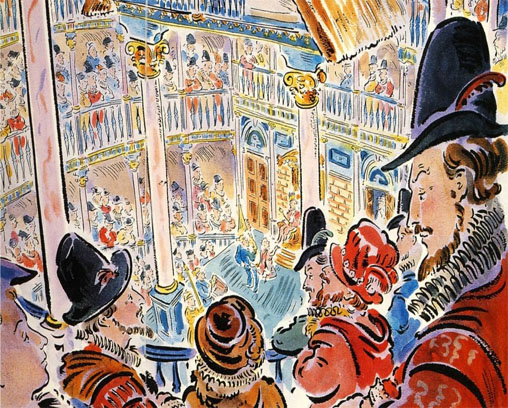
Image Source: seattleshakespeare
Shakespeare was a master of wordplay, and his works are a treasure trove of double entendres, witty puns, and sometimes downright crude humor. This was intentional; the playwright understood the power of laughter and how ribald jokes could appeal to the groundlings (the less-affluent crowd) as much as sophisticated wordplay delighted the nobility. If you understand the double meanings, scenes in plays like Much Ado About Nothing or Romeo and Juliet become even more hilarious and reveal deeper layers of character interaction.
Fact 3: Hamlet is Shakespeare’s longest and most complex play.
![Horatio, Hamlet, and the ghost (Artist: Henry Fuseli, 1789)[5]](https://top15facts.com/wp-content/uploads/2024/04/Horatio-Hamlet-and-the-ghost-Artist-Henry-Fuseli-1789.jpg)
Image Source: wikipedia
Clocking in at over 4,000 lines, Hamlet is a theatrical marathon. It’s a psychologically dense exploration of grief, revenge, madness (real or feigned), and the existential questions that plague humanity. The play’s famous soliloquies, especially “To be or not to be,” have become cornerstones of Western literature, their philosophical musings echoing through the ages. Hamlet isn’t just a play to be watched; it’s a puzzle to be pondered.
Read More: Decoding the Da Vinci Code: 15 Facts vs. Fiction Unveiled
Fact 4: Women weren’t allowed on stage – young boys played female roles.
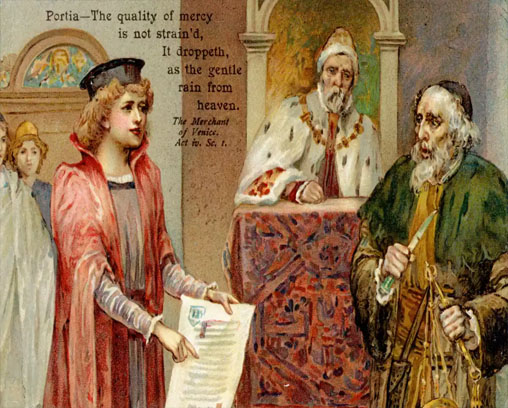
Image Source: thoughtco
In Elizabethan England, societal restrictions prevented women from becoming actors. This led to the fascinating convention of young boys, often pre-pubescent, being trained to portray iconic female characters. Think about the complexity – a boy playing a woman (like Juliet) who at times in the play might disguise herself as a boy! These young actors brought a unique energy and perhaps a different kind of vulnerability to the roles, adding an intriguing layer to our understanding of Shakespeare’s women.
Fact 5: Shakespeare invented thousands of words we still use today.
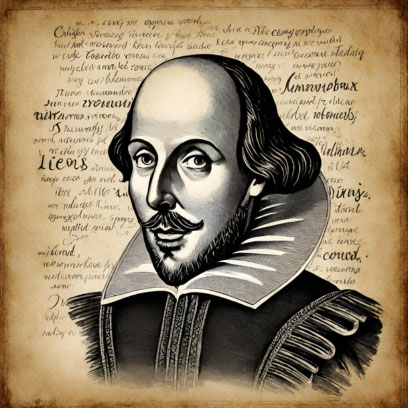
Shakespeare wasn’t merely a playwright; he was a linguistic innovator! It’s estimated that he coined over 1,700 words that have become ingrained in the English language. Words like “lonely,” “critical,” “addiction,” and “swagger” all sprang from the Bard’s fertile imagination. His plays are not simply entertainment; they are a testament to the power of language to shape how we see the world.
Fact 6: The Globe Theatre burned down during a performance.
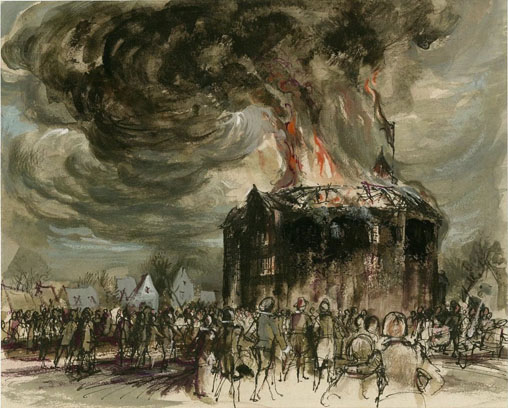
Imagine the scene: it’s 1613, and a performance of Shakespeare’s Henry VIII is underway at the iconic Globe Theatre. But disaster strikes! A stage cannon used for special effects misfires, setting the thatched roof alight. Within hours, the beloved playhouse is reduced to ashes. Thankfully, there were no casualties, and the Globe was rebuilt – a testament to the enduring popularity of Shakespeare’s work, even in the face of such a setback.
Read More: 15 Astonishing Van Gogh Facts You Didn’t Know
Fact 7: Some believe Shakespeare wasn’t the true author of his plays.
Conspiracy theories abound! Doubters, often called “anti-Stratfordians,” argue that a commoner from Stratford-upon-Avon couldn’t have possessed the knowledge or refinement to create the masterpieces attributed to Shakespeare. Proposed alternate authors include figures like Francis Bacon or Christopher Marlowe. This debate adds a tantalizing mystery to the Shakespearean legend, though most scholars maintain that the Bard from Stratford was indeed the genius behind the plays.
Read More about this Fact: Was Shakespeare the Real Author of His Plays?
Fact 8: Queen Elizabeth I was a big fan of Shakespeare’s comedies.
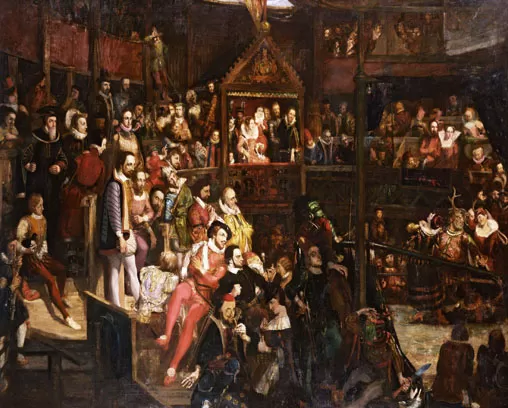
©Victoria and Albert Museum, London
Shakespeare’s company, the Lord Chamberlain’s Men, frequently performed at court, entertaining the powerful monarch. Queen Elizabeth I particularly loved his witty and lighthearted plays, like A Midsummer Night’s Dream and The Taming of the Shrew. Imagine Shakespeare himself anxiously hoping Elizabeth would find his latest work a royal success!
Fact 9: Many Shakespearean characters meet gruesome deaths.

Shakespeare wasn’t afraid of a little (or a lot of) bloodshed! His plays are littered with murders, suicides, and bloody battles. Characters are poisoned, stabbed, beheaded, and even baked into pies (Titus Andronicus gets particularly grisly). This dramatic violence was a reflection of the sometimes-brutal Elizabethan world and a surefire way to keep the audience on the edge of their seats.
Fact 10: Superstitions and curses are associated with Macbeth.

Image Source: wikipedia
Macbeth, the tale of a Scottish lord driven mad by ambition, is considered unlucky by many actors. They avoid saying the play’s name aloud in the theatre, instead referring to it as “The Scottish Play.” Legend has it that real witches were angered by Shakespeare’s use of their rituals and placed a curse on the play. Even today, there are quirky theatrical traditions meant to ward off bad luck if the dreaded name Macbeth is accidentally uttered.
Read More: 15 Surprising Renaissance Facts You Won’t Believe Are True
Fact 11: Shakespeare’s plays have been translated into over 80 languages.

Shakespeare’s universal themes of love, betrayal, power, and the complexities of the human spirit transcend both time and language. His work has been meticulously translated into over 80 languages, ensuring that audiences worldwide can experience the magic of his words. Whether it’s Hamlet performed in Japanese or The Merchant of Venice in Swahili, the Bard’s influence extends far beyond the borders of England.
Fact 12: Shakespeare likely collaborated with other playwrights.
While Shakespeare is celebrated as a lone genius, modern scholarship suggests that collaboration was more common in his era. Plays like Henry VI and Pericles, Prince of Tyre show stylistic differences that indicate multiple authors. This adds a fascinating dimension to our understanding of Elizabethan theatre – it was likely a more collaborative, fluid environment than we often imagine.
Fact 13: Some of Shakespeare’s most famous lines might be misquotes.
Did Hamlet actually say, “To be or not to be, that is the question”? While we think of this as the iconic line, the early texts of the play vary slightly. The printing process in Shakespeare’s time was less standardized, leading to variations and potential misremembering over time. Just like a game of “telephone,” the famous lines we quote today might be a bit different from how they originally left Shakespeare’s quill.
Fact 14: Shakespeare’s plays inspired countless artistic works.
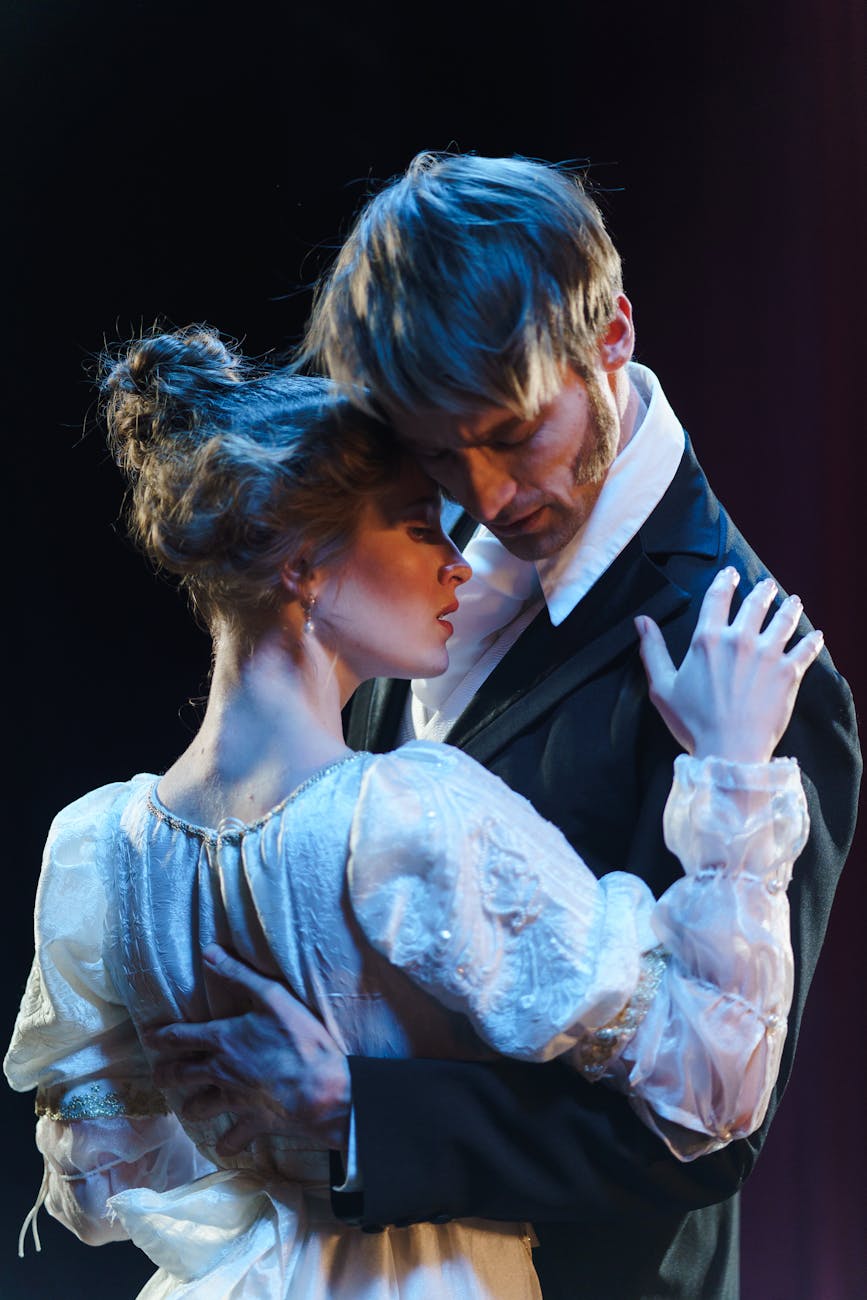
From operas to ballets, paintings to novels, Shakespeare’s influence ripples across the entire artistic landscape. Verdi’s Otello reimagines the tragedy as a powerful musical spectacle. Romantic painters like Delacroix found drama in scenes from Hamlet. Even modern films like 10 Things I Hate About You cleverly adapt Shakespearean plots. The Bard’s work is an eternally flowing wellspring of inspiration.
Read More: Top 15 Mind-Blowing Facts About the UK That Will Leave You Astounded
Fact 15: There’s a surprising connection between Hamlet and The Lion King.
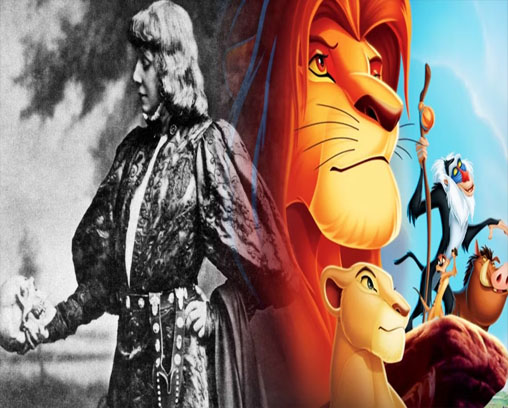
Disney’s beloved animated film The Lion King draws heavily on the plot of Hamlet. A young prince grapples with the murder of his father, a scheming uncle, and questions of his rightful place…sound familiar? The animators acknowledge the inspiration, adding a playful layer to this modern classic and demonstrating yet again the timeless appeal of Shakespeare’s storytelling.
Conclusion:
These surprising facts offer just a glimpse into the endlessly fascinating world of Shakespeare’s plays. They reveal a playwright who was a master storyteller, a keen observer of human nature, and a bold linguistic innovator. Whether you’re a lifelong fan or new to the Bard, these insights offer fresh ways to appreciate the enduring power of his words. The next time you experience a Shakespeare play, remember these hidden histories and the secrets they hold. You might be surprised at how much deeper your understanding becomes.
15 FAQs ( Frequently Asked Questions):
-
Why are Shakespeare’s plays still relevant today?
Shakespeare’s plays delve into universal human themes– love, loss, ambition, revenge – that resonate with audiences across cultures and centuries. His characters are complex and flawed, making them relatable even hundreds of years later.
-
Which Shakespeare play is the most popular?
It’s difficult to say definitively, but Hamlet, Romeo and Juliet, and Macbeth are strong contenders due to their compelling plots, iconic lines, and enduring appeal.
-
Where can I watch performances of Shakespeare’s plays?
From local theatre companies to major productions like those at the Royal Shakespeare Company, there are many ways to see Shakespeare live. Numerous film and television adaptations are also available, offering different interpretations of the classic plays.
-
Are there resources to help me understand Shakespeare’s language?
Yes! Websites like No Fear Shakespeare (https://www.sparknotes.com/shakespeare/) provide modern translations alongside the original text. Dictionaries specializing in Shakespearean vocabulary can also be helpful.
-
Did Shakespeare have any formal education?
While there’s no evidence of university attendance, Shakespeare likely attended the King’s New School in Stratford-upon-Avon. This would have provided him with a solid grounding in Latin, literature, and history – essential knowledge for a playwright of his caliber.
-
Are there different versions of Shakespeare’s plays?
Yes! Early printed versions (Quartos and the First Folio) have variations. This can be due to printing errors, actors’ memories, or even Shakespeare revising his own work.
-
Did Shakespeare write any poems besides plays?
Yes! His sonnets are highly regarded, as are longer narrative poems like “Venus and Adonis” and “The Rape of Lucrece.”
-
Why does Shakespeare use iambic pentameter?
Iambic pentameter mimics natural speech rhythms but elevates them. It gives the plays a sense of heightened language and makes memorable lines easier to remember for both actors and audiences.
-
Did Shakespeare’s plays have music?
Absolutely! Songs and instrumental music were integral to performances, setting moods, and providing entertainment during scene changes. Some original music still survives.
-
How long did a typical Shakespeare play performance last?
Around 2-3 hours, shorter than many modern theatrical experiences. Audiences stood for much of the performance and were expected to be more participatory.
-
Did Shakespeare know his plays would become so famous?
It’s hard to say for sure. He seemed interested in his plays having lasting value, but the sheer scale of his enduring fame may have surprised even him.
-
Are there any lost Shakespeare plays?
Possibly. Plays like Cardenio and Love’s Labour’s Won are mentioned in historical records but no copies exist today.
-
Is it okay to dislike Shakespeare?
Absolutely! Not every play will resonate with every person. Finding a play, character, or even just a few lines that you connect with is a great entry point.
-
Where can I learn more about Shakespeare?
Libraries are full of excellent books about Shakespeare. Websites like the Folger Shakespeare Library (https://www.folger.edu/) are also treasure troves of information.
-
Were Shakespeare’s plays popular in his own time?
Yes! Records show that his plays were commercial successes, filling the Globe Theatre and earning him patronage from wealthy nobles. He wasn’t just writing for intellectuals – his work appealed to audiences across social classes.


